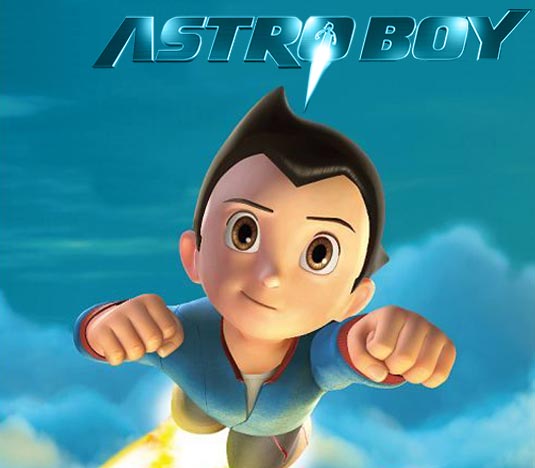
A few weeks ago I noted that the recent CGI animated version of Astro Boy had made it to cable TV and decided to watch it. I did so largely out of nostalgia for the lo-res black and white (at least as far as I was concerned, given my family’s TV at the time) version from my childhood. I was in for a surprise on many counts. For although my childish capacity may have missed them in those early viewings, the recent film had many rewards to offer an adult. The film was both funnier and far more serious than I remember the old animés being, and it is the serious part upon which I would like to reflect.
Among the serious themes were the conflict between fathers and sons, class consciousness and stratification, ecology, good and evil (no surprise there!), the use of power, and above all the question, “What does it mean to be human?” For Astro is a robot, something made not born —by the will of man but not of flesh and blood— taking his stand along with David from A.I. and their mutual progenitor Pinocchio, and their elder cousin Star Trek’s Data. All of them share the desire to be “real” — to be human, and you will pardon me if I say it is far more poignant in a child, even a CGI or animated child, than in an adult, though Data had his share of poignancy and wistful longing in pursuit of that enterprise.
Science fiction lends itself to this kind of speculation, which sometimes goes even farther afield. At a far step removed we have the fleshly efforts at anthropoesis, such as Dr. Frankenstein’s cut-and-paste Job, or his predecessor the Golem, animated to protect the ghetto. Neither of these is particularly childlike, nor successful at gaining, of even perhaps desirous of obtaining full humanity. As Dr. F’s benighted creature observes, "You live. We belong dead"; and it took only the elimination of the initial Aleph to move the Golem from animate emet (truth) to met (dead).

But even further from human likeness, I think of the tachikoma of the Japanese animé Ghost in the Shell: Stand Alone Complex. These spider-like and ungainly though surprisingly agile tanks would appear to be unlikely candidates for becoming human — so they press the envelope and force the question: can these bones live? They do have the voices of children, however, which begins to suggest their kinship with their brothers Astro, David, and Pinocchio. They also give us a clue that humanity is not necessarily about the form of the body but the content of the heart, and the ability not only to reason, but to love.
For as a subplot of the series, the tachikoma appear to be developing what the author calls “a ghost” — that is, what we might call “a soul.” And in an astounding episode, three of these “machines” choose to sacrifice themselves to save one of their human co-workers (himself a partly mechanical man). The sound of those three childlike voices embodied in dangerous and weapon-wielding tanks shouting out, “We have to save Mr. Batou!” as they rush to their own destruction still brings tears to my eyes. Yeah, I’m an old softy when it comes to this humanity stuff and “greater love hath no tachikoma...” And the same sort of thing happens to Astro, with similar poignancy, in his case as part of his effort to win back his “father’s” love. Bring a hanky.
So what does it mean to be human? We all trace our lives back to that first artificial human — you know, the one God made from clay. We all sense that we are called to be more than we are, and that we are not quite finished, not quite real yet. Perhaps this is more poignant when portrayed in a child because we recognize the connection between growing up to the full stature of humanity and simply growing up. We all have growing up to do.
May we all grow up into our full reality, as children of God.
Tobias Stanislas Haller BSG